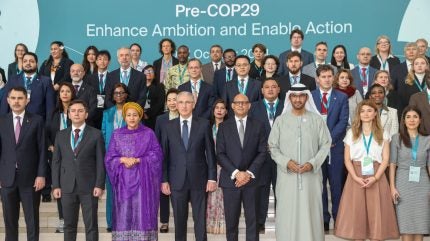
Ahead of the 29th Conference of the Parties to the UN Framework Convention on Climate Change (COP29), world leaders gathered last week in Baku, Azerbaijan, for the pre-COP meeting to advance negotiations on key priorities.
A month from now, at least 40,000 attendees will have arrived at the city for the annual climate conference, which this year will be held from 11–22 November.
The pre-COP meeting, entitled Enhance Ambition and Enable Action, saw global climate leaders, government officials, constituencies and delegates participating in negotiations on 10–11 October to make progress on the goal of limiting global warming to 1.5°C as per the 2015 Paris Agreement, ahead of the conference.
At the opening ceremony, COP29 President-Designate Mukhtar Babayev said: “The purpose of this session is to prepare for success at COP29. Given the complexity and high stakes involved in the mandated agenda items, we cannot afford to leave too much to be decided at the summit.”
According to the UN Environment Programme (UNEP), the planet is facing a rise of up to 2.9°C above pre-industrial levels by the end of the century, even with current pledges for emissions reduction. One report estimates that the crisis could cost $178trn in global economic losses by 2070.
What are the key priorities?
Azerbaijan has identified setting the New Collective Quantified Goal on Climate Finance (NCQG) as the top negotiating priority for COP29. The NCQG is a global climate finance goal agreed upon at COP15 in 2009 for developed countries to fund climate mitigation in developing countries. The goal was initially set at $100bn per year by 2020, then extended to 2025.
Developed countries reached this goal for the first time in 2022, two years later than the initial deadline and three years earlier than the latter, surpassing the target amount with $115.9bn in climate finance for developing countries.
Now, world leaders are aiming for an even more ambitious goal.
In an address delivered on behalf of President Ilham Aliyev of Azerbaijan, Babayev emphasised that the new NCQG to be agreed at COP29 should be one that “meets the needs of the developing, least developed and small island developing states” and represents “a substantial increase” over the prior goal.
The President-Designate also outlined goals for each of the other top negotiating priorities surrounding mitigation, adaptation and supporting vulnerable communities. He said: “We are also determined to conclude work on Article 6 of the Paris Agreement as a much-needed priority. This is crucial for directing financial and technical resources – enabling us to enhance ambition and enable action through carbon markets so that we can implement climate plans.”
Article 6 of the Paris Agreement establishes guidelines for international carbon markets, allowing countries to achieve emissions reduction targets set out in their nationally determined contributions (NDCs) by voluntarily cooperating with each other. Article 6.4 specifically includes a framework for the international transfer of greenhouse gas credits, but key issues surrounding methodologies and frameworks remain unresolved.
In addition, the Loss and Damage fund, whereby wealthier, higher-emitting nations would channel funding to assist developing countries that are particularly vulnerable to the climate crisis, also remains to be operationalised.
Babayev stressed the need to turn pledges into concrete, signed contributor agreements to the fund; attract “significantly greater contributions” to all climate funds including the Green Climate Fund and the Adaptation Fund; and respond to the call of the UAE Consensus to transition away from fossil fuels in a just and orderly manner.
The opening ceremony, livestreamed on YouTube, also featured speeches from UN deputy secretary-general Amina J Mohammed; UN climate change executive secretary Simon Stiell; COP28 president Sultan Al Jaber; and chair of the subsidiary body for implementation ambassador Nabeel Munir.
Stiell said: “Clearly finance is key among the concrete outcomes needed this year. An ambitious new goal is entirely in every nation’s and every economy’s interests. We can only prevent the climate crisis from decimating all economies – including the largest and wealthiest – if every country has the means to take much stronger climate actions.”



